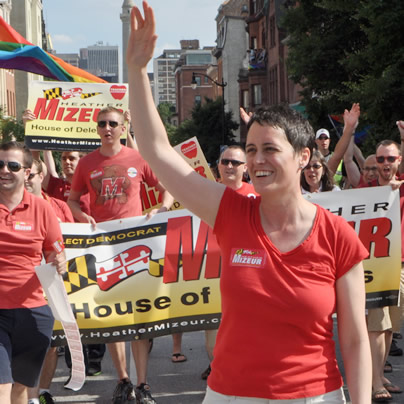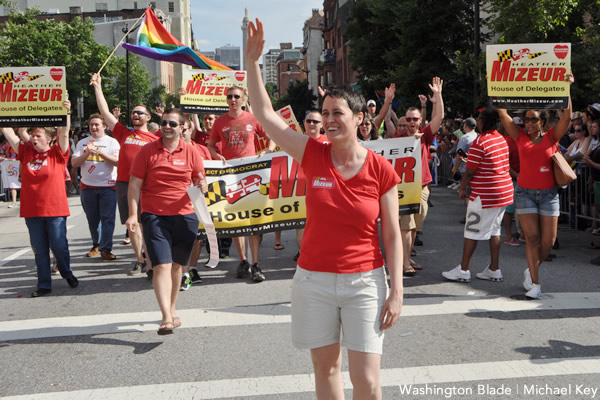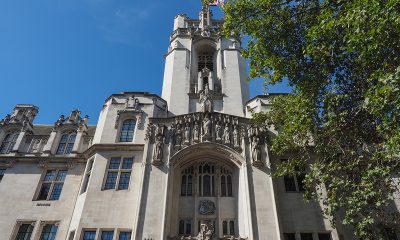Local
It’s official: Mizeur announces run for Md. governor
Democrat would become country’s first openly gay state executive

Maryland state Del. Heather Mizeur (D-Montgomery County) has formally announced her 2014 gubernatorial campaign.
“I’m running for governor because I love this state and I see limitless possibilities on what we can accomplish together,” she told the Washington Blade in an interview before she officially declared her candidacy in an e-mail to supporters. Mizeur cited economic development, protecting the state’s environment and improving the quality of Maryland’s public schools and health care system as among her top campaign issues. “There are great challenges facing us and also incredible opportunities.”
Mizeur, 40, has represented the 20th House District that includes Takoma Park and Silver Spring in the General Assembly since 2006.
The former Democratic National Committee member worked on now Secretary of State John Kerry’s 2004 presidential campaign. Mizeur in 2008 endorsed President Obama’s election campaign after her consideration of him or then-New York Sen. Hillary Clinton received national attention.
Mizeur would make history as Maryland’s first female governor and the country’s first openly LGBT governor if voters elect her in 2014.
“Diversity is enormously important,” she told the Blade. “Not simply to have a gay governor, but to have a governor who can represent the voices of people in communities that have not always had a voice in the process.”
Mizeur added her approach to governing the state and her vision for Maryland is “about bringing people together and making everyone a stakeholder and creating solutions to the issues” it faces.
Brown, Gansler have fundraising advantage
Mizeur will face off against Lieutenant Gov. Anthony Brown, who last month unveiled Howard County Executive Ken Ulman as his running mate. Attorney General Doug Gansler is expected to officially declare his candidacy to succeed Gov. Martin O’Malley in 2014 later this year, while Congressman Dutch Ruppersberger is also considered a potential candidate.
Harford County Executive David Craig, state Del. Ron George (R-Anne Arundel County,) 2012 U.S. Senate candidate Brian Vaeth and Frederick County Board of Commissioners President Blaine Young have also officially declared their candidacy on the Republican side.
Craig on Tuesday unveiled state Del. Jeannie Haddaway-Riccio (R-Talbot County) as his running mate.
Former Republican National Committee Chair Michael Steele, who was Maryland’s lieutenant governor from 2003-2007, said last month during an interview with MSNBC’s Chuck Todd he is “looking at” entering the race. Former 2010 congressional candidate Charles Lollar is among the other Republicans who are rumored to be considering their own gubernatorial bids.
EMILY’s List and the Gay and Lesbian Victory Fund are expected to back Mizeur’s campaign, but campaign finance reports indicate both Brown and Gansler have a significant fundraising advantage.
Mizeur reported in a campaign finance report she filed in January that she raised $244,089.40 between Jan. 12, 2012, and January 9 of this year. Brown said he raised $1,247,811.80 in cash and in-kind donations during the same period, while Gansler netted $1,236,284.96.
Mizeur declined to disclose to the Blade the amount of money she has raised since the last campaign finance report she filed in January.
She again stressed she feels she is the best person to succeed O’Malley in Annapolis in 2014.
“I’m not going to go into office playing it safe for four years so that I can assure myself of re-election,” Mizeur said. “The bold, aggressive, visionary ideas that I’m laying out in the course of the campaign is the action agenda for my term as governor.”
Mizeur defends role she played to advance marriage bill
Rev. Delman Coates of Mt. Ennon Baptist Church in Prince George’s County and other LGBT rights advocates have applauded Mizeur for the role she played in the passage of Maryland’s same-sex marriage referendum last November in spite of Marylanders for Marriage Equality Campaign Manager Josh Levin’s suggestion that she could have done more to support the effort.
Mizeur pointed out to the Blade during an exclusive interview last fall during which she announced she was considering a run for governor that she took part in fundraising events and testified in support of the bill. The Montgomery County Democrat, who married her wife, Deborah Mizeur, during a 2005 ceremony along the Chesapeake Bay and again in California before voters in 2008 approved Proposition 8 that banned gay nuptials in the state, also gave an emotional speech on the floor of the House of Delegates before it passed the same-sex marriage bill in 2012.
Mizeur also noted she and the other seven openly gay Maryland lawmakers remained focused on the same-sex marriage effort throughout the 2012 legislative session.
“Each of us was working hard in our own way,” Mizeur told the Blade last fall. “My entire public schedule was Question 6-related for months.”
Mizeur said she also worked “very closely” with Gender Rights Maryland Executive Director Dana Beyer earlier this year to advance a bill that would have banned anti-transgender discrimination in housing, employment and public accommodation.
The Senate Judicial Proceedings Committee in March narrowly struck down the measure.
Mizeur pointed to both the same-sex marriage and trans rights bills as examples of her “ability to work with my colleagues” to “push through some pretty big efforts.”
“I will continue to build on those relationships in order to get other priority issues pushed through the General Assembly,” she said
Beyer, who supports Mizeur, on Tuesday described the Montgomery County Democrat as “a force to be reckoned with.”
“History can be made,” Beyer told the Blade. “Identity politics aside, Heather does her job really well.”
While not explicitly endorsing Mizeur’s campaign, Equality Maryland PAC Chair Tim Williams welcomed her candidacy and other out Marylanders who have decided to seek office in 2014.
“The presence of at least one openly gay candidate in the governor’s race, as well as the many LGBT individuals and allies who are running for other state and local offices, is an indication of how far we have come as a state and a nation,” Williams said in a statement to the Blade.
District of Columbia
Two charged with assaulting, robbing gay man at D.C. CVS store
Incident occurred after suspects, victim ‘exchanged words’ at bar

D.C. police just after 1 a.m. on April 10 arrested two men for allegedly assaulting and robbing a gay man inside a CVS store at 1418 P St., N.W., according to a police report and charging documents filed in D.C. Superior Court.
The charging documents state that the alleged assault and robbery occurred a short time after the three men “exchanged words” at the gay bar Number 9, which is located across the street from the CVS.
The arrested men are identified in the charging documents as Marquel Jose Diaz, 27, of Northwest D.C., and Lorenzo Jesse Scafidi, 21, of Elizabeth City, N.C. An affidavit in support of the arrest for Diaz says Diaz and the victim “were previously in a relationship for a year.”
Court records show Diaz was charged with Simple Assault, Theft Second Degree, and Possession of a Controlled Substance. The court records show the controlled substance charge was filed by police after Diaz was found to be in possession of a powdered substance that tested positive for cocaine.
Scafidi was charged with Simple Assault and Theft Second Degree, the court records show.
The D.C. police report for the incident does not list it as a suspected hate crime.
The court records show both men pleaded not guilty to the charges against them at a Superior Court arraignment on the day of their arrest on April 10. The records show they were released by a judge while awaiting trial with an order that they “stay away” from the victim. They are scheduled to return to court for a status hearing on May 21.
The separate police-filed affidavits in support of the arrests of both Diaz and Scafidi each state that the two men and the victim “exchanged words” inside the Number 9 bar. The two documents state that both men then entered the CVS store after the victim went to the store a short time earlier.
Scafidi “came into the CVS shortly after and entered the candy aisle and slammed Complainant 1 [the victim] to the ground causing Complainant 1’s phone to fall out of CP-1’s pocket,” one of the two affidavits says. It says Scafidi “again picked up CP-1 and slammed him to the ground.”
The affidavit in support of Diaz’s arrest says Diaz also followed the victim to the CVS store after words were exchanged at the bar. It says that after Scafidi allegedly knocked the victim down in the candy aisle Diaz picked up the victim’s phone, “swung on” the victim “while he was still on the ground,” and picked up the victim’s watch before he and Scafidi fled the scene.
Without saying why, the two arrest affidavits say Diaz and Scafidi returned to the scene and were arrested by police after the victim and at least one witness identified them as having assaulted and robbed the victim.
Attorneys representing the two arrested men did not respond to phone messages from the Washington Blade seeking comment and asking whether their clients dispute the allegations against them.
The victim also did not respond to attempts by the Blade to obtain a comment from him. The police report says the victim is a resident of Fairfax, Va.
District of Columbia
Bowser calls for ‘extraordinary’ response to reduction in D.C. budget
Impact on city funding for LGBTQ programs and grants unclear

D.C. Mayor Muriel Bowser on April 15 issued an executive order calling for “extraordinary actions,” including “significant cuts in District Government services,” to address a decision by Congress to cut the city’s current budget by $1.1 billion.
The nine-page executive order points out that these actions became necessary after the U.S. House of Representatives has so far declined to vote on a free-standing bill approved by the U.S. Senate last month that would restore the $1.1 billion D.C. budget cut initially approved by the House.
In addition to large-scale cuts in city services, the mayoral order says the congressionally imposed city budget cut will bring about city “hiring freezes, financial impacts to employees, reductions and terminations in contracts and grants, and closures of District Government facilities.”
The order adds, “These are unprecedented actions given that the District itself adopted and is able to implement a fully balanced budget, but they are necessary due to the Congressional cut to the District’s budget and its inaction in timely fixing its legislative error.”
The House adjourned this week on a recess until the end of April, and congressional observers say it is unclear whether the majority Republican House will take up the Senate bill to undo the D.C. budget cut when the House returns from its recess. President Donald Trump has called on the House to approve the bill to restore the full D.C. budget.
Among the D.C. LGBTQ organizations and those providing services to the LGBTQ community that receive D.C. government funding and that could be impacted by the budget cuts are Capital Pride Alliance, which is organizing WorldPride 2025 set to take place in D.C. next month; and Whitman-Walker Health, one of the city’s largest private healthcare organizations that provides medical services for LGBTQ clients.
Also receiving city funding are the Wanda Alston Foundation, which provides housing services for LGBTQ people; and the LGBTQ youth advocacy and services organization SMYAL.
Spokespersons for the four organizations couldn’t immediately be reached to determine if they knew whether the soon-to-be implemented budget cuts would have an impact on the city funding they currently receive.
In response to questions from news reporters during an April 15 press conference call to discuss the Bowser executive order, Jenny Reed, director of the D.C. Office of Budget and Performance Management, said details on specific programs or funding allocations set to be cut would not be known until the mayor submits to the D.C. Council her Supplemental FY 2025 budget along with her proposed FY 2026 budget.
Reed was joined at the press briefing by Lindsey Parker, Mayor Bowser’s chief of staff; and Tomas Talamante, director of the Office of Intergovernmental Affairs.
They and other city officials have said the impact of the congressionally imposed city budget cut was expected to be lessened but remain highly problematic by Bowser’s decision to invoke a 2009 law that allows the city to increase its own spending without approval by Congress under certain circumstances.
The mayor has said under that law, the city would need to cut its FY 2025 budget by $410 million rather than by $1.1 billion. It couldn’t immediately be determined whether House Republicans, who initiated the requirement that the D.C. budget be cut by $1.1 billion, would challenge the mayor’s plan to invoke the 2009 law to reduce the size of the budget cut.
“Without the ability to fully execute the Fiscal Year 2025 budget as adopted and approved by the District, this gap will force reductions in critical services provided by our largest agencies, including the Metropolitan Police Department and the Fire and Emergency Medical Services Department,” the mayor’s executive order states.
“The District will continue to work with members of the House of Representatives to urge them to vote to fully restore the District’s Fiscal year 2025 budget and will continue to work with President Trump to strongly encourage the House of Representatives to take that action,” the order says.
District of Columbia
LGBTQ budget advocates fight for D.C. resources in a tough fiscal year
‘Trying to preserve life-saving services’ amid $1 billion cut

The months and days leading up to June are especially busy for LGBTQ Washingtonians. For one group, the DC LGBT Budget Coalition, which works year-round to ensure LGBTQ residents are represented and financially supported by the D.C. government, this time of year is their Super Bowl. Beginning in April, the D.C. Council and Mayor’s Office hold budget hearings for the next fiscal year.
With D.C.’s budget now under review, the Washington Blade spoke with Heidi Ellis, coordinator of the DC LGBT Budget Coalition, about the group’s top priorities and their push to ensure continued support for queer communities.
“The LGBTQ Budget Coalition was founded in 2020 at the height of the pandemic, as a way for the community to work together to advocate for key funding and policy changes,” Ellis said. “We recognized we were stronger together. A lot of groups are often pitted against each other for resources and dollars. This coalition was founded out of a need for unity. Since then, we’ve successfully advocated for more than $20 million in dedicated LGBTQ investments.”
In addition to coordinating the coalition, Ellis is the founder and CEO of HME Consulting & Advocacy, a firm that helps build coalitions and advance policy initiatives that address intersectional issues in the LGBTQ community. One of its most powerful tools, she explained, is direct outreach through community surveys.
“We actually do community surveys to see what people need and what’s top of mind,” Ellis said. “Of course, we also pay attention to the broader political landscape — like the current threats to HIV funding. That helps us prioritize.”
Because the coalition is comprised of more than 20 organizations across various sectors —healthcare, housing, community organizing — Ellis said its diversity enables it to connect grassroots needs to potential policy solutions.
“Our coalition includes service providers, community groups, health and housing advocates-folks who are deeply plugged into what’s happening on the ground,” she said. “They help determine our direction. We know we don’t represent every queer person in D.C., but our coalition reflects a wide range of identities and experiences.”
The insights gathered through those surveys ultimately inform the coalition’s annual budget proposal, which is submitted to the Council and mayor.
“That’s how we got to our FY26 priorities,” she said. “This year, more than ever, we’re fighting to protect what we’ve already secured — funding and policies we’ve had to fight for in the past. We know there’s concern around this budget.”
One of the challenges this year is that the D.C. government’s operating budget and some of its legislation must be approved by Congress. With a projected decline in tax revenue and a Republican-controlled Congress that has historically opposed LGBTQ funding, the Coalition has had to think strategically.
“Even before the situation on the Hill, the CFO projected lower revenue,” Ellis said. “That meant cuts to social programs were already coming. And now, with the $1 billion slashed from D.C.’s budget due to the continuing resolution, we’re not only fighting for D.C.’s budget and autonomy, but also trying to preserve life-saving services. Our message is simple: Don’t forget about queer people.”
This year’s proposal doesn’t include specific dollar figures. Instead, the Coalition outlines five funding priority areas: Healthcare, Employment & Economic Equity, Housing, Safety & Community Support, and Civil Rights.
Why no exact amounts? Ellis said it’s because not all solutions are financial.
“Some of our asks don’t require new funding. Others build on existing programs-we’re asking whether the current use of funds is the most effective. We’re also proposing policy changes that wouldn’t cost extra but could make a real difference. It’s about using what we have better,” she said.
When drafting the proposal, the Coalition tries to prioritize those with the most pressing and intersecting needs.
“Our perspective is: If we advocate for the most vulnerable, others benefit too,” Ellis said. “Take LGBTQ seniors. Some may have done well in life but now face housing insecurity or struggle to access affordable healthcare. Many in our coalition are elders who fought on the frontlines during the AIDS epidemic. They bring critical historical context and remind us that Black and brown communities bore the brunt of that crisis.”
“I love our coalition because it keeps us accountable to the moment,” she added. “If we center those most marginalized, we can make an impact that lifts everyone.”
In addition to healthcare and housing, safety remains a top concern. The Coalition has fought to maintain funding for the Violence Prevention and Response Team (VPART), a city-supported group that includes MPD, community-based organizations, and the Mayor’s Office of LGBTQ Affairs. VPART responds to crimes affecting the LGBTQ community and connects victims to legal, healthcare, and housing services.
“We’ve pushed to make VPART more proactive, not just reactive,” Ellis said. “The funding we’ve secured has helped survivors get the support they need. Cutting that funding now would undo progress we’re just beginning to see.”
At the end of the day, Ellis emphasized that this process is about far more than spreadsheets.
“A budget is a moral document,” she said. “If we’re not represented, you’re telling us our lives don’t matter at a time when we need protection the most. When people can’t get food, medicine, housing — that has a devastating impact. These are vital services.”
The DC LGBT Budget Coalition is urging residents to support a letter-writing campaign to D.C. Council members and the mayor. You can send a letter here: https://actionnetwork.org/letters/fully-fund-dcs-lgbtq-communities
Read the full FY26 budget proposal here: https://drive.google.com/file/d/1bTrENnc4ZazJTO6LPrQ3lZkF02QNIIf1/view
-

 District of Columbia2 days ago
District of Columbia2 days agoReenactment of 1965 gay rights protest at White House set for April 17
-

 Maryland3 days ago
Maryland3 days agoFreeState Justice: Transgender activist ‘hijacked’ Moore’s Transgender Day of Visibility event
-

 Hungary3 days ago
Hungary3 days agoHungarian MPs amend constitution to ban public LGBTQ events
-

 Real Estate3 days ago
Real Estate3 days agoNavigating DMV real estate market during political unrest












